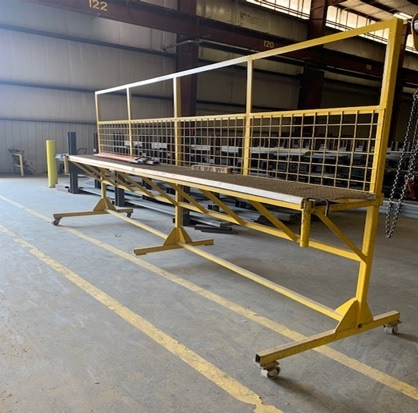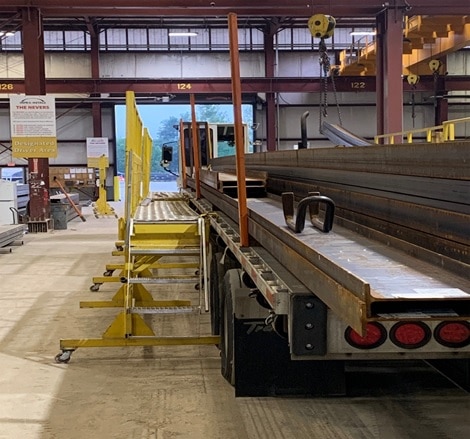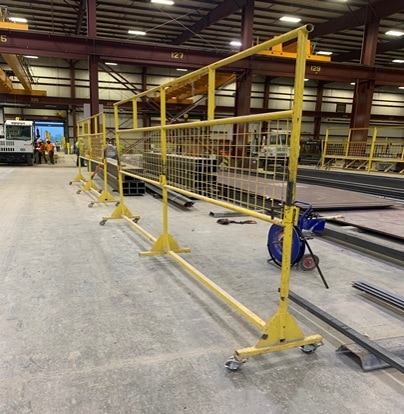On May 11, 2022, Infra-Metals and Delta Steel received the 2021 MSCI Safety Innovation & Improvement Award for the the Infra-Metals Trailer Rail Safety System.
In early 2019, our company had experienced several injuries and/or near misses resulting from falls from trailers. As a result, we challenged ourselves to find a solution to eliminate and reduce the fall risk while working on top of a trailer deck.
The Infra-Metals Trailer Rail Safety System is a fall prevention safety device which provides a barrier around the perimeter of the fall hazard when working on top of a flat bed trailer deck. The system eliminates the fall hazard that would normally require a fall protection device. It is lightweight, portable, durable, and can be installed quickly by attaching the safety device to the trailers existing rub rail. The safety device is made from welded and bent tubing and can be sized to fit multiple trailer configurations and can used in area’s where width is a concern. A newer version with a walk platform has been developed when materials prevent a walking area on the trailer and casters were added for ease of movement.
on top of a flat bed trailer deck. The system eliminates the fall hazard that would normally require a fall protection device. It is lightweight, portable, durable, and can be installed quickly by attaching the safety device to the trailers existing rub rail. The safety device is made from welded and bent tubing and can be sized to fit multiple trailer configurations and can used in area’s where width is a concern. A newer version with a walk platform has been developed when materials prevent a walking area on the trailer and casters were added for ease of movement.
From Concept to Execution
We created a multi-location team that consisted of a mix of shop personnel and our highest-level management to brainstorm and test potential solutions. Our research revealed that while we could reduce the number of times, we got onto the trailer deck there were still circumstances where it was unavoidable. We reviewed, purchased and tested several promising devises that were available on the market, but none were effective in meeting our operational requirements.
Infra-Metals and Delta Steel personnel were collectively brainstorming amongst our locations for potential solutions to keep employees safe while working on top of trailers. At the time, Greg Borchardt was the General Manager of Infra-Metals in Petersburg, VA but was transitioning to take over for retiring VP of Operations – Mike Dean, who had initiated the project. We reviewed several different safety devices such as attachable netting and tie-off devices.
During one of these conversations, our GM in our Infra-Metals Marseilles location, Dave VonHolst, mentioned that he had seen some loading platforms in the nearby Nucor Tubular Mill. He inquired with them and was able to get some drawings and was offered a set of platforms to try as a loan. These were nice and spanned the full length of the trailer, included a platform to stand on, a handrail to keep you from falling, and they were on casters. The only problems were that they were heavy and wide. They would not work in our facilities due to the width requirements.
Around the same point in time, our Infra-Metals Wallingford facility had purchased a set of aluminum side rails that would fit into the stake pockets of a trailer. They were conducting a trial of these in their loading operation and they worked, but it took a lot of time to set them up and take them off. They were also difficult to pick up by yourself and get high enough in the air to seat them in the pockets. They were safe but not effective and management worried about the strain of setting 6 of these per trailer on every trailer we handled. These devices would solve the fall risk issue but it would create a strain and sprain hazard in our work environment.
There were several requirements we had established:
- The device had to be slim
- Be easy to move around
- Use casters to eliminate the to lift it
- Support a persons’ weight if they fell against it
- Prevent a fall risk while on a trailer deck
We studied the drawings and the pictures of the potential solutions and evaluated the benefits of both. We needed to somehow take the effectiveness of both and make them work for our facilities.
The Solution
The trailers have side rails and stake pockets that we can hook into to provide the lateral stability, so the base doesn’t need to be wide to make them stable if we hook them onto the trailer. We drew out a very rough sketch. It was skeleton made from handrail pipe with wheels and a sliding hook that you could roll up to a trailer, slide the latches up and then hook them onto the side rail. We decided that it needed to be 16’ long which would be light enough to roll in and out of place easily and only take 3 devices per side to cover the entire length of a flat bed trailer. We then took the sketch to the Operations Manager of Infra-Metals Petersburg – Roy Glass and Maintenance Supervisor – Joe Krevonich. We asked them to put their heads together and build a prototype that we could test. It took them about a day, and they had built the first prototype that they thought would work. We took some videos and sent them to Mike Dean, who was Vice President at the time, and explained the concept to him through short videos of the device.
As it turns out, Mike had been asked to sit on a task force with other Reliance Steel and Aluminum family of company’s personnel to try and solve this problem. Also a member of this task force was Ed Comer, who is a Safety Specialist with Reliance that we have worked closely with in the past to solve many different problems. They took the ball and ran with. We worked with a fabricator who was also a customer to develop a 3D CAD drawing for the device. Another Reliance Steel company with engineers on staff made sure the safety device would handle the lateral load. They also produced a set of fabrication drawings to build from. Mike then sent Greg the drawings so we could have a local fabricator customer build a set of 6. We were able use these to evaluate the safety device on the shop floor in a real operational setting.
When this first set of 6 were complete, we put them to use in the Infra-Metals Petersburg warehouse. The feedback from our operators was mixed. They understood the benefit, but it was also another step in the operation, and it slowed them down. As we continued our live evaluation, we realized it only took a few minutes at each stop for the trailer. It wasn’t strenuous and the devise didn’t take up valuable space. The device performance exceeded expectations for eliminating the fall risk while working on a flat bed trailer.
With the support of our President Mark Haight, we rolled them out to all of our locations.
Commitment to continual improvement:
As we began to roll the devices out and use them, one of our locations met with yet another fabricator customer to potentially build them locally. Our General Manager at our Infra-Metals New Boston Facility – PJ Rase and the customer produced another iteration. They built a narrow rail that still hooks into the trailer but added a working platform to it. These had the benefit of a stable platform to work from with a handrail but still maintaining a small enough width to be useable in our facilities. We found that when you use the original narrow rail on one side of the trailer and the larger rail with the platform on the other side the safety device was also complementing our production requirements.
Lessons Learned
As it goes with all good stories, there’s a plot twist at the end. Today we have the safety rails located and in use at all of our Infra-Metals and Delta Steel locations. We also have been able to establish a firm policy that nobody is permitted on a trailer unless they have the safety rails in place. The twist is that we have continued to introduce “No-Touch” tools and find innovative ways to eliminate the necessity to get on top of flat bed trailers.
While we have significantly reduced the number of times, we get on top of a flat bed trailer with the use of these tools we understand our operations will continue to face scenarios when working on top is the only way to perform certain tasks on a flat bed trailer.
- OSHA shows in 2020 flatbed trailers have been involved in 592 major injuries or fatalities.
- Infra-Metals and Delta Steel had approximately 60 near-miss or OSHA recordable injuries from 2015 through 2019 working on top of flatbed trailers.
- Infra-Metals and Delta Steel reduced the number of near-misses or OSHA recordables to approximately 4 from the time the flat bed trailer safety device was introduced in 2019 through 2020
Conclusion
We have significantly reduced the number of flatbed trailer near-misses and injuries due to the introduction of the “Trailer Safety Rail System” and our “No Touch” tools but our job is not done. We are committed to not just moving steel, but moving steel safely. At Infra-Metals and Delta Steel our number one priority is the safety of our team members, and we will continue to seek innovative ways to do our jobs safer.
Infra-Metals Co. was founded in 1990 intent on becoming the premier steel service center servicing the structural steel market. Since our inception, we have grown into one of the largest service centers with locations along the East Coast from New England to South Florida as well as into the Midwest from Illinois through Ohio and on through the Southwest in Texas. Delta Steel, Inc. is also a member of the Infra Metals organization and both belong to the Reliance Steel & Aluminum Co. Family of Companies.



